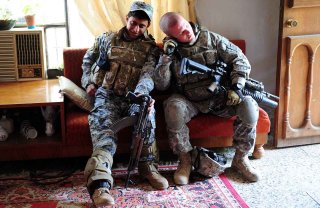The War on Terror Playlist: Here's What U.S. Troops Listened to on Deployment
“I have literally returned fire with “Call Me Maybe” on,” said one Army veteran.
Military.com recently conducted a fascinating inquiry amongst Global War on Terror veterans, asking ‘What Songs Defined Your Military Service During the Global War on Terror?’ “What songs defined your service during the Global War on Terror?” the survey asked. Well, the results are in—and they offer a glimpse into the zeitgeist of Iraq, Afghanistan, and the home front during a time transitional and controversial time.
Song and War
The association of song with war is hardly new. Armies have enlisted musicians for centuries, to establish marching cadences, signal charges, or to commemorate a special event. Popular music, too, has a tendency to be infused, and to inversely infuse, war. “Remember Pearl Harbor” by Don Reid and Sammy Kaye is an obvious example, written the week after the Japanese surprise attack, that became synonymous with the Pacific theater of World War II. Vietnam, of course, instigated a cultural upheaval that was often expressed in song, and has since become entwined with the conflict itself: “Fortunate Son” by Creedence Clearwater Revival; “War” by Edwin Starr; and “For What It’s Worth” by Buffalo Springfield are well-known examples that often accompany film about the war. And don’t forget: the nation’s anthem, ‘The Star-Spangled Banner’ by Francis Scott Key was born of the War of 1812.
The Global War on Terror, however, has never had the cultural prominence of earlier conflicts. The war was controversial, seemingly perpetual, and conducted with far less investment from the average citizen. The music that American forces associated with the Global War on Terror never transcended to become more widely associated with the conflict amongst the general public. Likewise, the general public never made music to commemorate, celebrate, or deride the conflict. So as far as the average citizen is concerned, the war had no discernible soundtrack. The new Military.com polls suggests otherwise, however; here is what the soldiers were listening to during the Iraq and Afghanistan campaigns.
The Survey Says...
Military.com’s findings will be familiar to anyone who played high school sports in the aughts; the troops closely associated “Bodies” by Drowning Pool with the conflict. “Originally pulled from radio play following the Sept. 11 terror attacks over concerns over the lyrics,” [the song] “is considered the moto pump-up song for a significant number of Military.com readers.” Coincidentally, the song was also used to interrogate detainees at Guantanamo Bay.
“When I’m Gone” by 3 Doors Down was also closely associated with the conflict, thanks to lyrics written about life on the road (as touring musicians) that relate closely to life on deployment. 3 Doors Down acknowledged the relationship between the song and the military and released a music video featuring a live performance shot aboard the USS George Washington.
“Bring Me to Life” by Evanescence registered deeply with many Global War on Terror veterans. Evanescence “hit a nerve for me as the deployments wore on,” one Marine veteran wrote to Military.com. “I still cannot help getting emotional when I hear these songs today.”
Other songs receiving recognition were country tunes, like “God Bless the USA” by Lee Greenwood and “Courtesy of the Red, White and Blue” by Toby Keith, and rock staples, like “Thunderstruck” by AC/DC and “War Pigs” by Black Sabbath—which is roughly what you might expect. But one song in heavy rotation during the conflict was somewhat unexpected: “Call Me Maybe” by Carly Rae Jepson. “I have literally returned fire with “Call Me Maybe” on,” said one Army veteran.
Harrison Kass is a senior defense and national security writer with over 1,000 total pieces on issues involving global affairs. An attorney, pilot, guitarist, and minor pro hockey player, Harrison joined the US Air Force as a Pilot Trainee but was medically discharged. Harrison holds a BA from Lake Forest College, a JD from the University of Oregon, and an MA from New York University. Harrison listens to Dokken.
Image: Wikimedia Commons.

